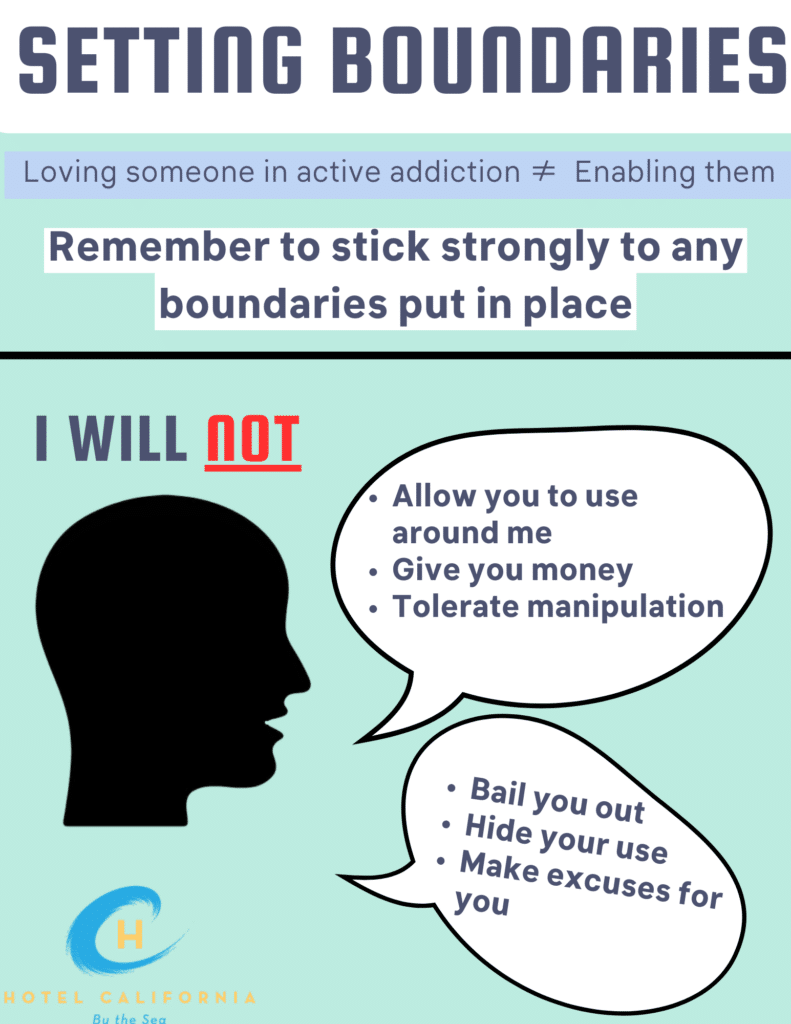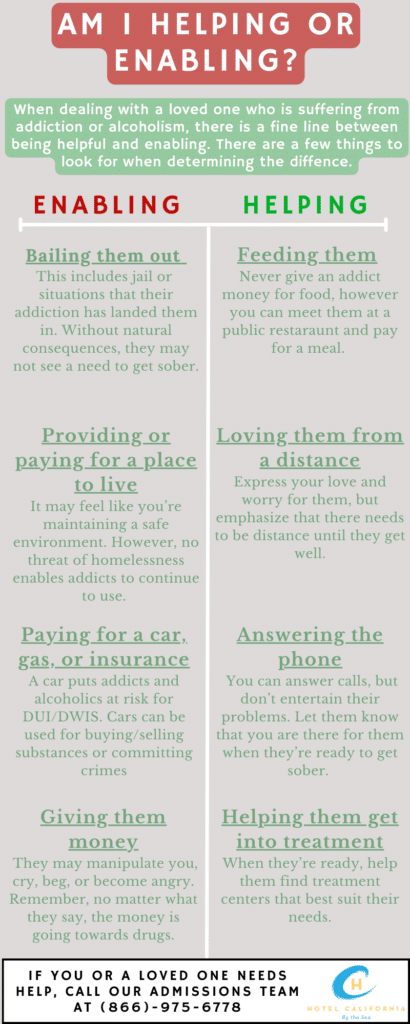Are you Enabling an Addict?
Are you supporting your loved one with a substance use disorder? Or are you enabling them? What is the difference? Supporting an addict and enabling an addict are two very different forms of help. Addiction is a disease that not only affects the substance abuser, but their family, friends and loved ones. It is only natural to want to help them treat and recover from this disease.
Supporting your loved one with a substance addiction will help them medically and strategically recover from their mental health condition. However, it does not protect them from the consequences and responsibilities of their actions. On the other hand, enabling a loved one with a drug addiction only supports their dangerous and self-destructive habits without treating the underlying issues. Enabling a loved one allows the addiction to flourish.

According to Webster’s dictionary, enabling is the process in which a person contributes to continued maladaptive and pathological behaviors in another person. It is anything, including positive actions that reinforces and supports substance-using behaviors. Enabling is more about the comfort and satisfaction it brings to you when you provide support to another person who should be facing the consequences of their actions.
Most people are unaware they are enabling their loved ones and hindering the recovery of their addiction. It usually happens by accident. Friends, family and loved ones often accidentally make situations worse despite well-meaning intentions. One of the biggest factors that contribute to family members continuing to enable drug-using behaviors, is the fear of letting go. It is the fear of no longer being needed in the relationship. When you enable a person, you disable that person from being able to do something different for the better. It prevents them from changing their negative behaviors into positive behaviors and prevents them from seeking professional help.

Signs of Enabling
Enabling a person with a substance use disorder can lead to the development of codependency. Codependency is a major sign of enabling a drug addict. This happens when there is an excessive reliance on a person who may need more support due to an addiction or illness. Codependency is a compulsive and self-destructive behavior that hinders a person’s ability to have a healthy relationship. This type of behavior encourages a one-sided relationship. Many times this type of enabling behavior comes from dysfunctional family dynamics. There are other signs of enabling including denial, low self-esteem, compliance, control and avoidance.
Denial is when a person finds it difficult to express their feelings and instead projects negative traits onto others. This person believes they do not need help from others and often masks pain with anger and engages in passive-aggressive behaviors. When dealing with a loved one with a substance use disorder the person in denial expects the addict to be rational and to be able to control their drug use.
Low self-esteem is a trait in which a person believes they are not good enough despite constant praise and recognition. A person with low self-esteem struggles with organizing priorities and setting healthy emotional boundaries. It is especially prevalent when family members deal with an addict.

Compliant people often give up what they want for the necessity of the greater good. They disregard consequences and often change and alter their beliefs to be accepted by others. Enabling family members often go out of their way to sacrifice for the substance abuser to feel needed and accepted by them.
Control is a character trait defined as those who believe they can fully care for themselves. Oftentimes they like to offer unsolicited advice and as well as use material objects and favors to influence people. People with controlling character traits refuse to compromise or negotiate. Enabling a loved one with a drug addiction allows the person to feel in control of the addict’s situation thinking they will be able to help them without seeking professional help.
Avoidance. It is when a person often strays away from confrontation by using vague language and words. This person rarely expresses their feelings in fear of appearing weak because they equate emotions to weakness. They often try to keep the peace and feel the need to take care of the problem to not upset anyone else.
Check Your Insurance Coverage for FREE
Find out if your insurance covers addiction treatment in minutes. We accept most insurance!
How to Stop Enabling an Addict
- Stop ignoring dangerous and alarming behaviors. If you begin to notice a pattern of out-of-character behaviors, excessive drinking and drug use, do not ignore it. Talk to another family member about it, talk to the user, or seek out professional help.
- Stop providing housing, material or financial resources. Giving users a safety net allows an addiction to prosper. Oftentimes users will seek out drugs or money for drugs. Do not drink or do drugs with them and do not provide them with financial assistance.
- Stop lying and making up excuses for their destructive behaviors. Enablers often feel the need to protect their loved ones by protecting their image with friends and family. Covering for them prevents the addict from facing responsibility and the consequences of their actions.
- Stop resenting users for their addiction. Addiction is a disease. Like other diseases, it needs to be treated physically and psychologically with professional and clinical help.
- Stop prioritizing the addict’s needs before your own. Set healthy boundaries and learn effective communication techniques. Be sure to engage in self-care for yourself.
- Stop acting out of fear. Fear of losing your loved one to addiction often blinds people from doing what they know is the right thing to do. Do not take on responsibilities for them.
- Detach yourself. Detachment is learning how to stop overreacting to an addict and their crisis. When an addict reaches out to you, there is no need to provide an immediate response. Check all the facts before reacting. Family and friends can love and support the addict and not the addiction and behaviors associated with the drug addiction. It is ok to say no.
- Learn not to prevent a crisis. Substance users should be held accountable for their actions. Their consequences are not your emergency. They need to be able to take responsibility for themselves. Do not save them from legal trouble.
- Do not parallel your emotions or feelings to theirs. If you begin to align your feelings with an addict, you develop a codependency. It is not healthy for either party.
- Do not allow yourself to be blamed. Substance abusers are “blame throwers.” They will make you feel guilty and ashamed of their problems. When the reality is, it is not your issue and detaching yourself from these feelings will stop enabling them.
- Learn about the addiction and create a support system. Learning more about the addiction and how it affects the user can give you better insight into what obstacles they may be going through. Suggest participating in family recovery and attending recovery support groups such as AA.
Reach out to Hotel California by the Sea
We specialize in treating addiction and other co-occurring disorders, such as PTSD. Our Admissions specialists are available to walk you through the best options for treating your addiction.
Treatment for Substance Use and Alcohol Use Disorder
Addiction is a disease that affects the entire community. It is often a disease that can be overcome with the help of a strong support system. A support system of friends, family and loved ones, along with a medical team can provide the tools and resources for addicts to achieve sobriety. At Hotel California by the Sea, our substance use disorder program offers clinical support and evidence-based treatments. Within our three locations in California, Ohio and Washington State, clients from across the nation can receive care for their addiction and co-occurring mental health disorders.
We provide all levels of care including detox, inpatient residential, PHP and IOP. Our unique addiction treatments include CBT, DBT and group therapy. This allows clients to understand the root causes of their addiction. Clients will receive individualized care plans addressing all aspects of addiction. Hotel California by the Sea understands that there is no one-size-fits-all when it comes to addiction treatment and recovery.
References:
https://dictionary.apa.org/enabling
http://www.uphs.upenn.edu/addiction/berman/family/enabling.html
https://www.verywellmind.com/how-to-stop-enabling-an-alcoholic-63083
https://www.addictioncenter.com/treatment/stage-intervention/what-is-an-enabler/
https://family-intervention.com/blog/how-to-detach-from-an-addict-and-still-love-them-without-enabling-them/
https://www.drugrehab.com/addiction/enabling-vs-helping/
https://drugfree.org/article/am-i-enabling-addiction-by-helping-my-child/
